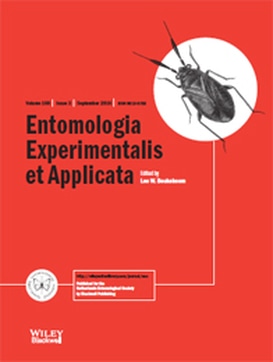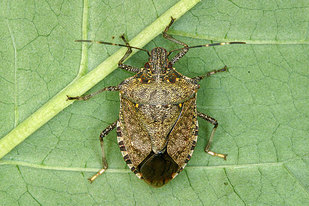 Which companion plants affect the performance of green peach aphid on host plants? Testing of 12 candidate plants under laboratory conditions Entomologia Experimentalis et Applicata Link Here Want to deter aphids? Plant some rosemary throughout the garden, African and French marigolds work well too. A group of French researchers designed an experiment that tested how effective 12 different companion plants were at deterring aphids from infesting a garden. The researchers set up two rows of pepper plants inside 13 individual growing chambers (there were 12 companion plants treatments and one control treatment with no companion plant), and then placed adult female aphids on each plant. Then, the various companion plants were set in between the two rows of pepper plants and allowed to grow alongside each other. Each day, the scientists would count the number of adult females remaining on the pepper plants, and also the number of neonate nymphs (baby aphids) that were produced by the adult female. During the 12 day experiment, the scientists found that the aphids were more likely to flee from the pepper plants that were near companion plants. The control pepper plants did not lose any aphids, as the bugs were happy in their companion-plant-free environment. They also found that rosemary, lavender, geranium, African marigold, and French marigold significantly decreased the numbers of aphids being reproduced on the pepper leaves. In the end, rosemary outperformed the other companion plants in both deterring aphids, and lowering their reproduction numbers. The scientists attribute this effect to the VOC, or volatile organic compounds, produced by the plants. The VOCs signal to the aphids that the vegetation in a certain area near companion plants is not suitable for rearing young, so encourages the bugs to search on for more reproduction friendly fields. It looks like a flat of rosemary will be on the planting list for this spring.
1 Comment
 Compost Tea Reduces Egg Hatch and Early-Stage Nymphal Development of Halyomorpha halys (Hemiptera: Pentatomidae) Florida Entomologist 2014 Click for Full Text Scientists in Florida have shown compost tea helps control brown marmorated stink bugs. These stink bugs are a significant agricultural pest in the US and around the world. A non-areated compost tea extract made from a mix of mushroom compost and chicken manure was sprayed on egg masses laid by the stink bugs. The researchers found that the egg masses had a 13% drop in hatching, and even more improtantly, the nymphs that hatched were 3 times less likely to survive their first stage of development. The researchers do not conclude why compost tea has this affect, but do speculate that the microbes in tea may interfere with bacteria that live in the stink bug's gut. I wonder what other bugs are bugged by my tea? |
Archives
June 2024
Categories
All
|
Contact Us
Why TeaLAB?TeaLAB is committed to helping people and their gardens to become more self- sufficient, healthier, and productive. Grow your sweetest corn, your biggest watermelon, your tallest quinoa, your tastiest tomato, and your happiest you.
TeaLAB was founded to teach people how to garden organically, so that we can become more closely connected with the land. Our goal has been to simplify growing methods so that gardeners have a positive experience in the garden. TeaLAB is where the garden meets the laboratory. From around the world and into your backyard, our products contain ingredients that are sourced both locally and globally. Using methods both ancient and cutting edge, TeaLAB promotes maximum biology. Grow with TeaLAB. |

 RSS Feed
RSS Feed
